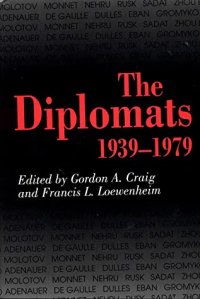
Ebook: The Diplomats, 1939-1979
Author: Gordon A. Craig, Francis L. Loewenheim, Akira Iriye, Shu Guang Zhang, Rena Fonseca, Michael Brecher, Raphael Israeli, Paul Gordon Lauren, A. James McAdams, John Lewis Gaddis, Norman Stone, Steven Merritt Miner, Richardson Dougall, Ernest R. May, Geoffrey Warner, Richard D. Challener, Victor H. Feske, Stanley Hoffmann, W.W. Rostow, Piotr Wandycz
- Year: 1994
- Publisher: Princeton University Press
- Language: English
- pdf
Expanding the field of inquiry covered by its acclaimed predecessor, "The Diplomats, 1919-1939, which concentrated on Europe and the coming of the Second World War, these essays showcase the major diplomatic practitioners of the period against the broader background of the problems and crises that confronted them--among others, the Polish question at the end of World War II, the onset of the Cold War, the defeat of EDC in 1954, the Suez crisis, Khrushchev's Berlin note in 1958, the Middle East War of 1967 and the oil shock of 1973, the Iranian revolution, and the Soviet invasion of Afghanistan. This account of the pendular swing from crisis to detente and back again is given a global perspective by careful treatment of the diplomacy of new nations like India, Communist China, and Israel, and of the transformation of the Middle East and Japan.
Among the new perspectives offered here are Geoffrey Warner's critical view of Ernest Bevin's attitude toward the United States, John Lewis Gaddis's judgment of Henry Kissinger's detente policy, W. W. Rostow's analysis of the diplomatic method of Paul Monnet, Rena Fonseca'sassessment of Nehru's policy of nonalignment, Shu Guang Zhang's fresh look at the relationship between Zhou Enlai and Mao, and Paul Gordon Lauren's critique of U.N. crisis management from Trygve Lie to Perez de Cuellar. Highly original also are Steven Miner's portrait of Molotov, Michael Brecher's pioneering study of the diplomacy of Abba Eben, and James McAdams's analysis of German "Ostpolitik.